By clicking a retailer link you consent to third-party cookies that track your onward journey. This enables W? to receive an affiliate commission if you make a purchase, which supports our mission to be the UK's consumer champion.
Best paper shredders
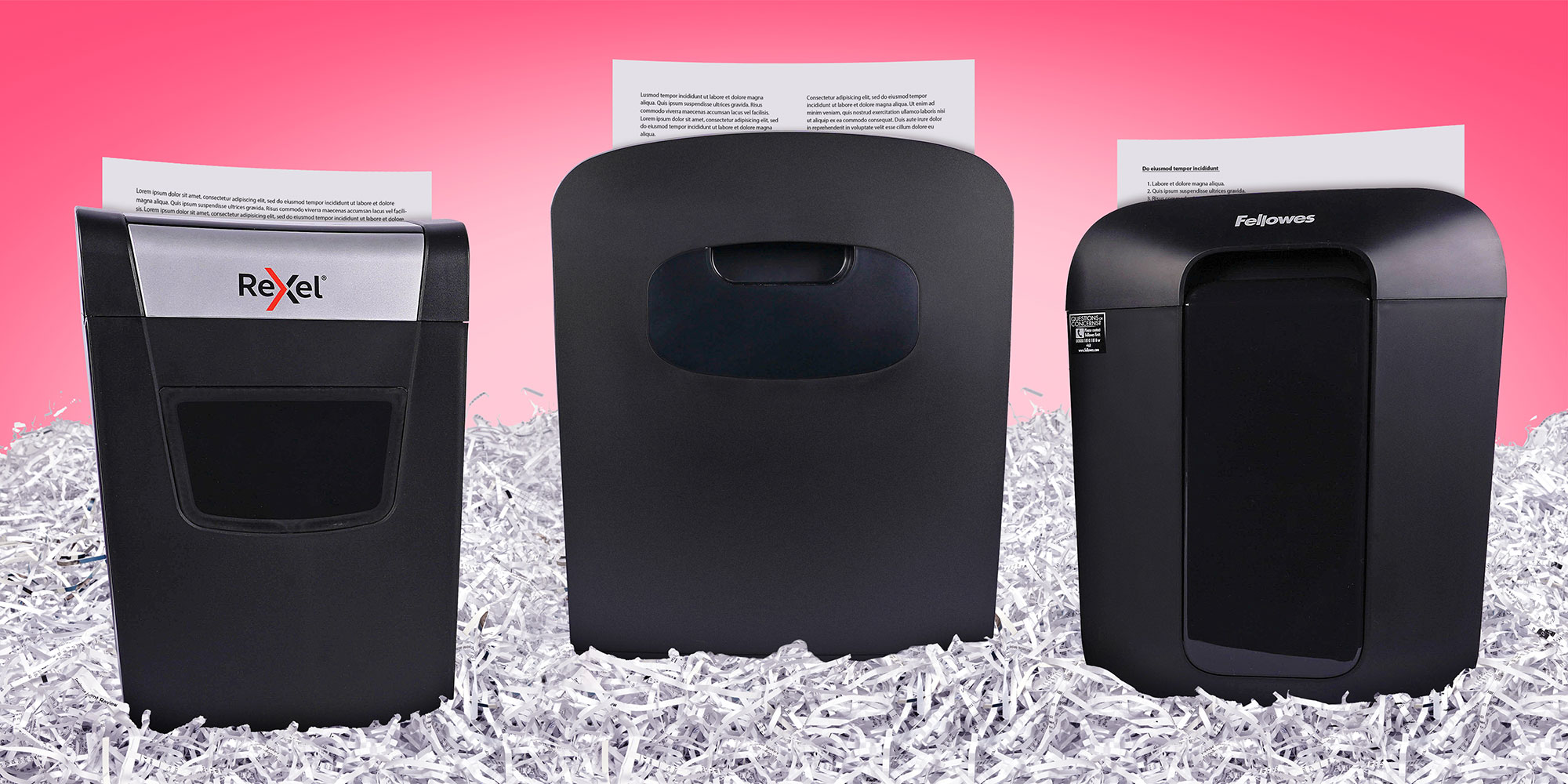
You can rely on the best paper shredders to securely dispose of documents containing personal data and help you avoid identity theft.
We’ve tested cross-cut, micro-cut and strip-cut paper shredders from popular brands and retailers – including Amazon, Argos, Currys, Fellowes and Rexel. We set out to discover how easy they are to feed and empty, how many sheets you can shred before emptying the bin, how fast and noisy they are, and how they handle unblocking paper jams.
Our tests have found two brilliant Best Buy paper shredders, as well as two high-quality and lower-priced shredders that we've named Great Value.
How our tests find you the best
We've tested 19 shredders
We check which shredders can be relied on to shred your documents quickly, securely and with minimum fuss.
Security
We measure tiny shreds of paper to check that no one will be able to piece them back together and go on a shopping spree with your bank details.
Clearing jams
We try to reverse wads of paper out of the shredder, and wrestle them out when it doesn’t work, so you don’t have to.
We also test
Number of pages per pass, ease of feeding in and emptying paper, how quickly paper feeds through the shredder, and how loud the shredder is.
The paper shredders we tested
The biggest brands and the most popular 10 paper shredders are listed below.
Only logged-in Which? members can view the paper shredder test results.
Join Which? to get instant access to our test results and Best Buy recommendations.
| Paper shredder | Price | Score | Security* | Speed | Ease of clearing jams** |
|---|---|---|---|---|---|
Sign up to reveal Get instant access to this and all our scores and recommendations Unlock tableDigital £8.99 per month, cancel any time. Already a member? Log in | 97% | ||||
| 89% | |||||
| 82% | |||||
| 80% | |||||
| 79% | |||||
| 76% | |||||
| 76% | |||||
| 76% | |||||
| 71% | |||||
| 70% |
Sign up to reveal
Get instant access to this and all our scores and recommendations
Unlock tableDigital £8.99 per month, cancel any time.
Already a member? Log in
Date tested: July 2025, December 2023. Page last checked: November 2025. We are not able to show every retailer, and cheaper prices may be available. We've tested 19 paper shredders in total, but the table shows our top picks only.
*Our simplified rating of how securely the machine shreds documents in a domestic setting. This is separate from the official security 'P rating' of shredders, which ranges from P1-P7 and is often used to determine suitability for use by government, financial institutions and so on. Shredders for home use rarely have P security ratings higher than P4.
**Based on our rating of how effectively the reverse function helps to remove paper jammed in the shredder.
A selection of the paper shredders we tested is listed in alphabetical order below.
Only logged-in Which? members can view the best paper shredders from our tests.
Join Which? to get instant access to our test results and Best Buy recommendations.
Amazon Basics 5-6 Sheet Cross Cut Paper Shredder AS668C
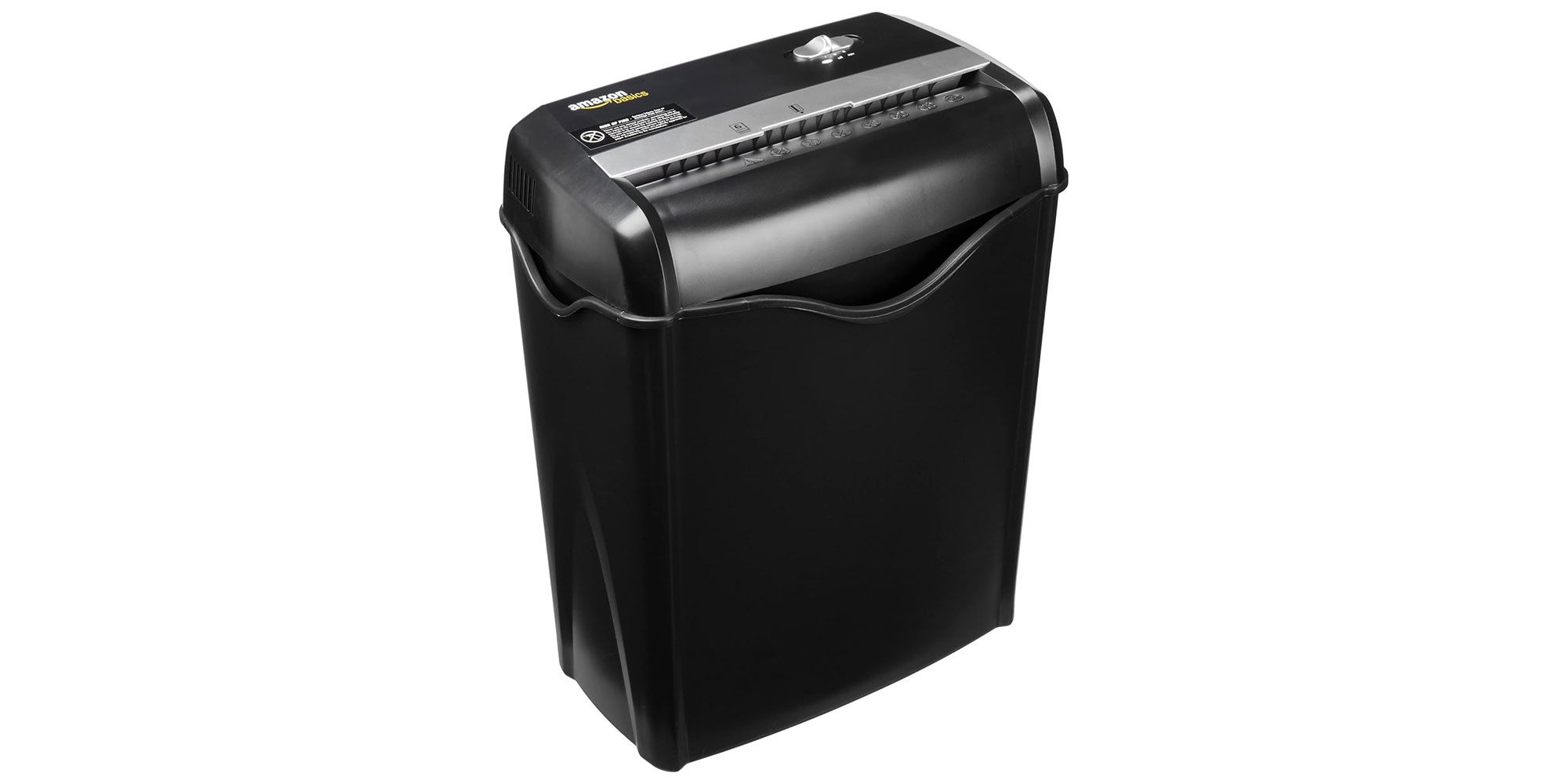
Most recently tested July 2025
Type Cross-cut
Size and weight 38.1 x 30.5 x 19.6cm (HxWxD), 3.65kg
Need to know Three minutes claimed runtime/30 minutes cooldown, claimed to shred five sheets at once, P3 security rating, 14.3-litre bin, accepts credit cards, staples and small paperclips, one-year warranty
Bonsaii 12-Sheet Micro Cut Paper Shredder C266-B
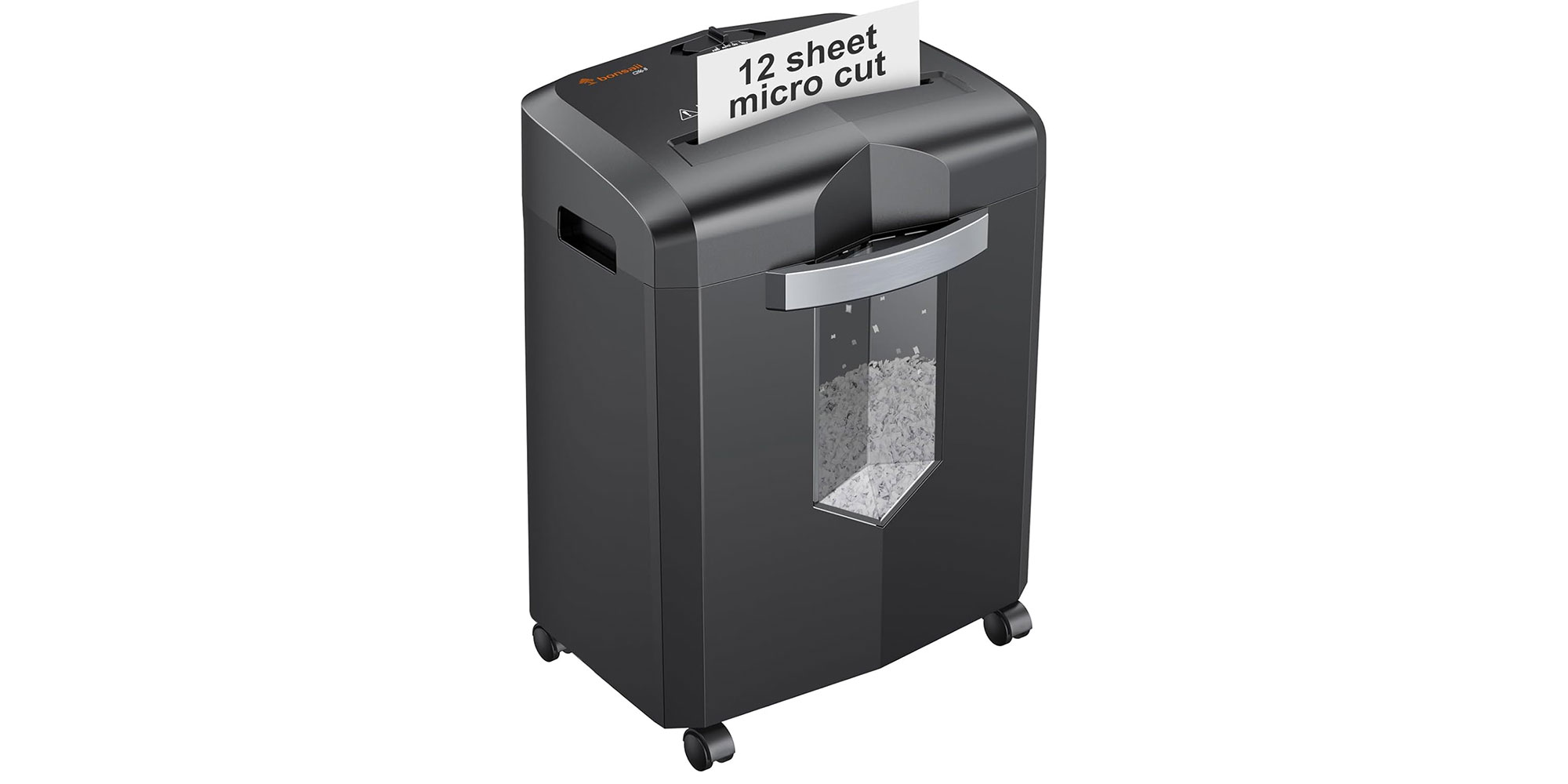
Most recently tested July 2025
Type Micro-cut
Size and weight 45.8 x 33.4 x 24.2cm (HxWxD), 6.8kg
Need to know 60 minutes claimed runtime/20 minutes cooldown, claimed to shred 12 sheets at once, P4 security rating, 16-litre bin, accepts credit cards, staples, paperclips and CDs, two-year warranty, comes with castors
Dahle Papersafe PS100
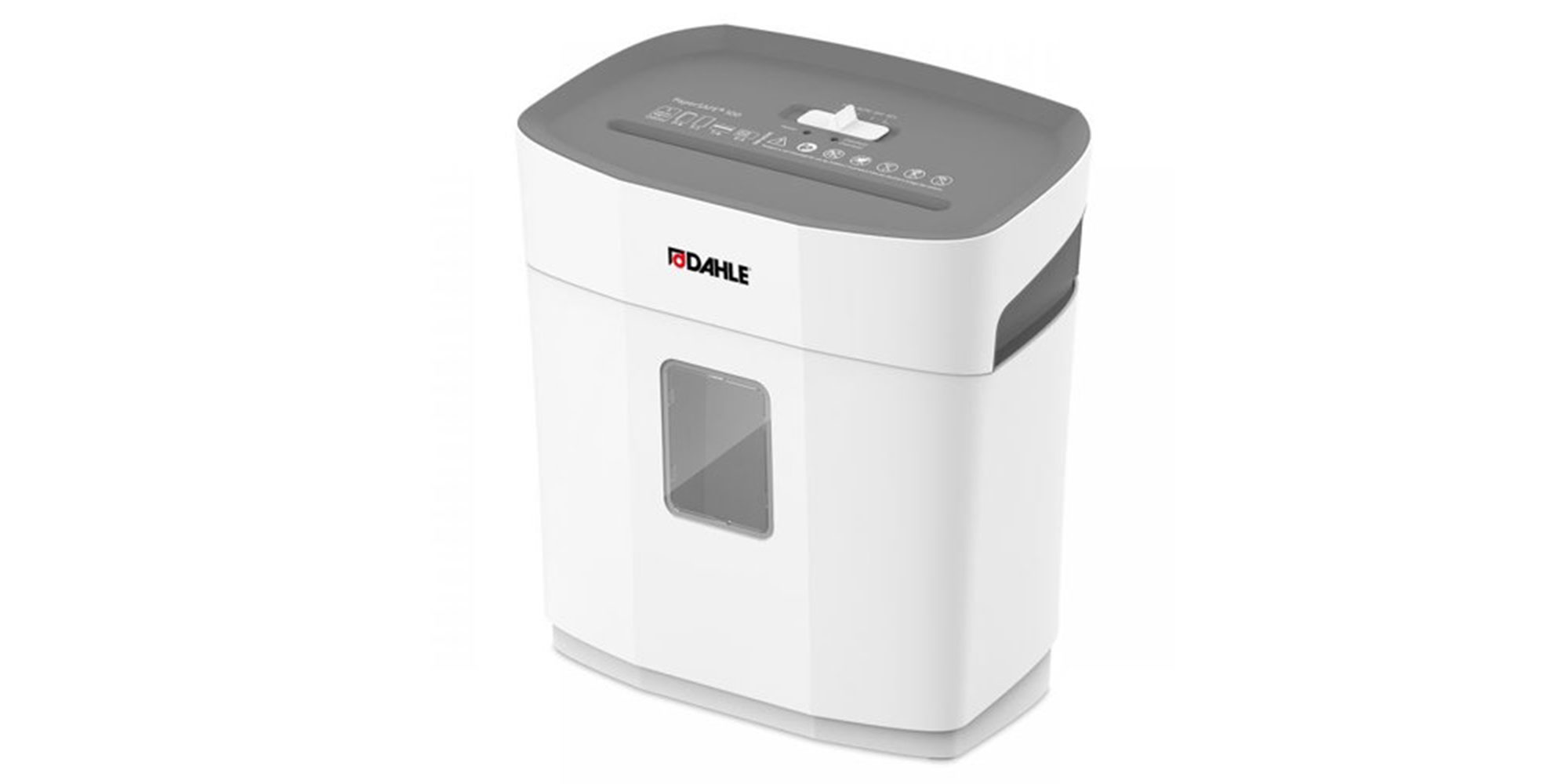
Most recently tested July 2025
Type Cross-cut
Size and weight 36.5 x 35 x 22cm (HxWxD), 3.6kg
Need to know Four minutes claimed runtime/40 minutes cooldown, claimed to shred five sheets at once, P4 security rating, 12-litre bin, accepts credit cards, staples, paperclips and CDs, two-year warranty
Duronic Micro Cut Paper Shredder PS410

Most recently tested July 2025
Type Micro-cut
Size and weight 43 x 33 x 23.5cm (HxWxD); 6.4kg
Need to know Three minutes claimed runtime/30 mins cooldown, claimed to shred eight sheets at once, P4 security rating, 14-litre bin, accepts credit cards, staples, envelopes and boxes, two-year warranty, comes with castors
Fellowes Powershred FS-6C
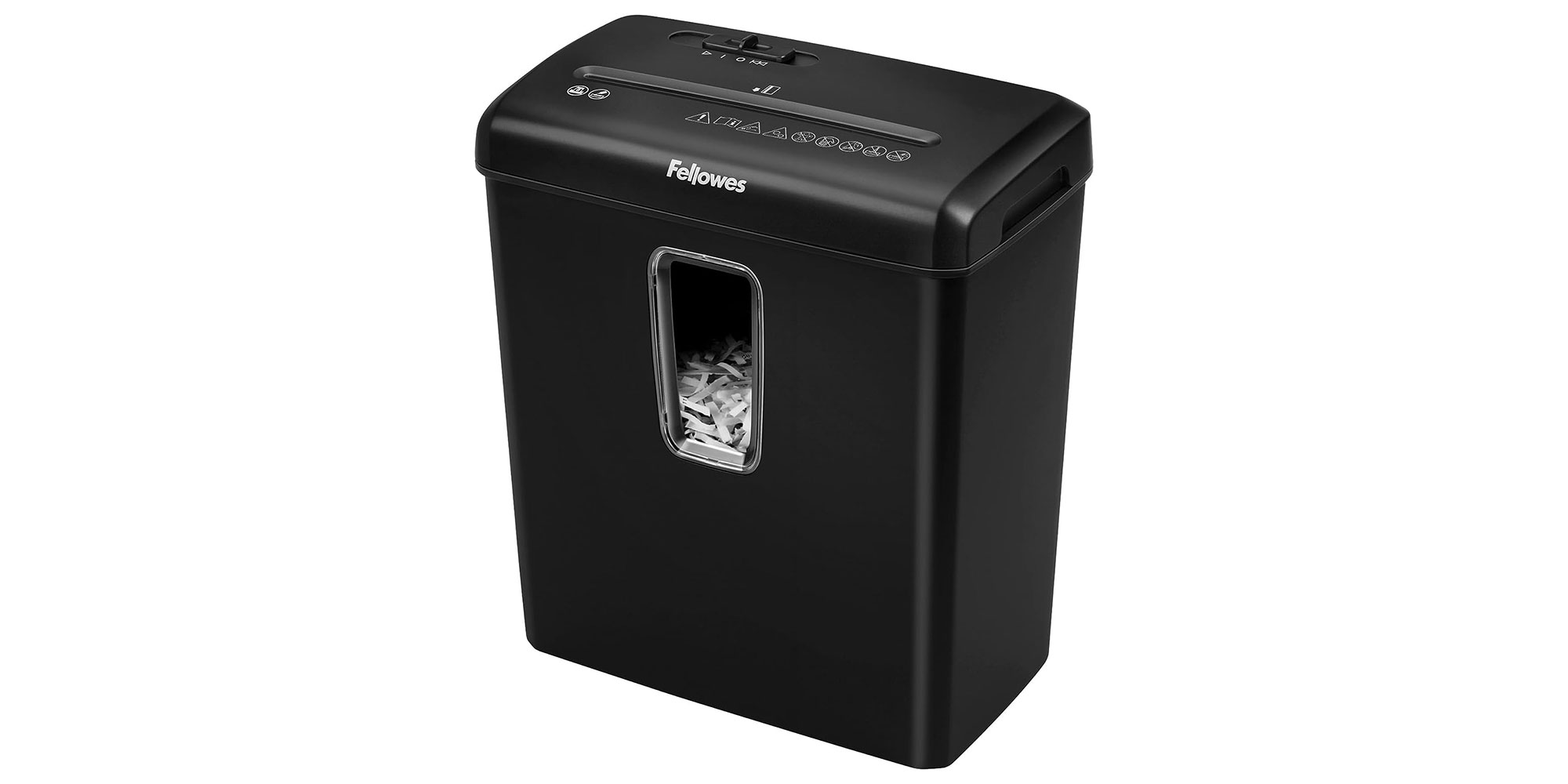
Most recently tested July 2025
Type Cross-cut
Size and weight 37.2 x 32.7 x 18.5cm (HxWxD), 3.7kg
Need to know Three minutes claimed runtime/40 minutes cooldown, claimed to shred six sheets at once, P4 security rating, 16-litre bin, accepts credit cards and staples, three-year warranty
Are you kitting out your home office? See our reviews of the best printers and printer ink
Fellowes Powershred LX50
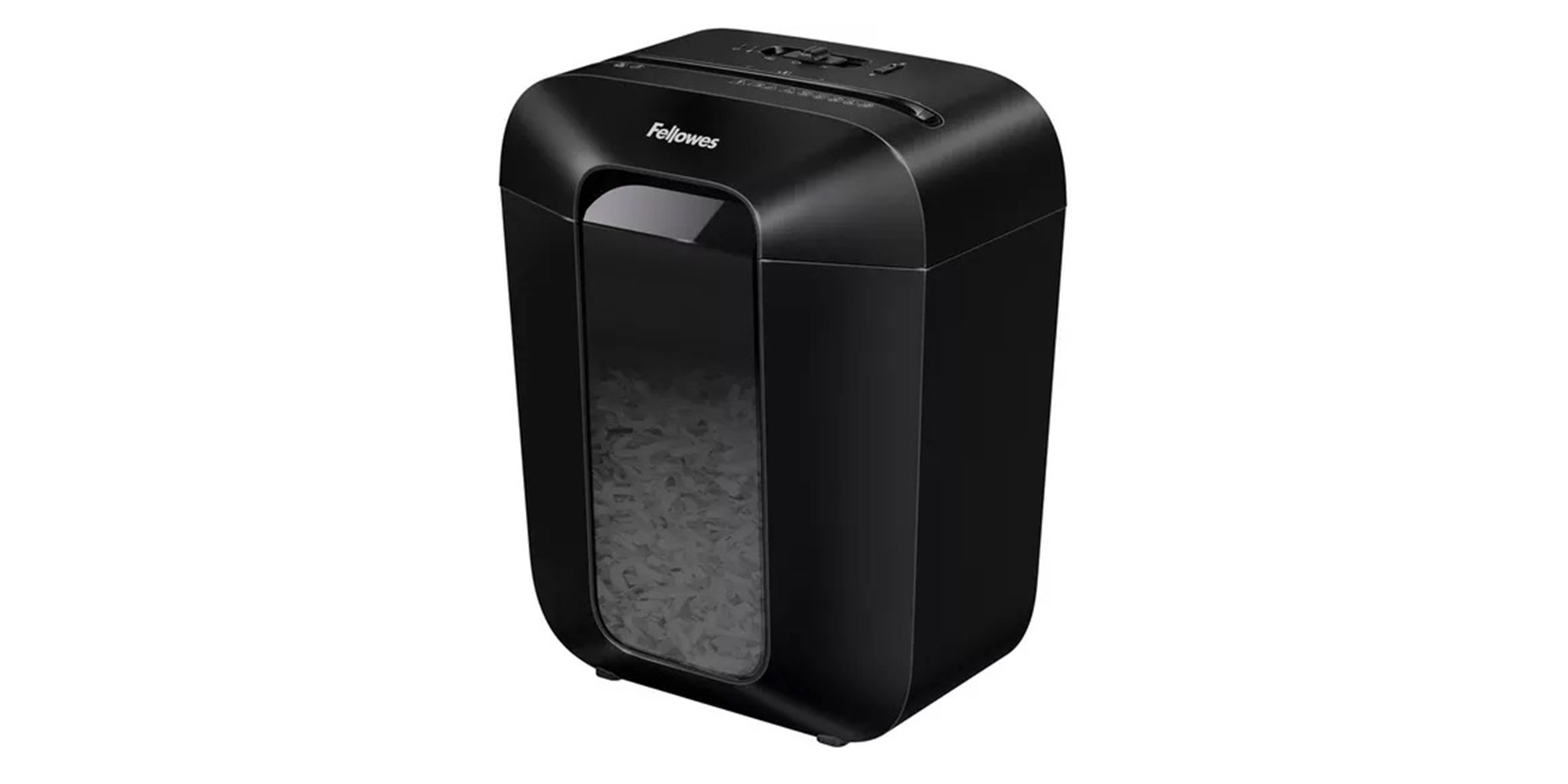
Most recently tested July 2025
Type Cross-cut
Size and weight 40.1 x 31 x 22cm (HxWxD), 4.5kg
Need to know Five minutes claimed runtime/30 minutes cooldown, claimed to shred nine sheets at once, P4 security rating, 17-litre bin, accepts credit cards, staples and paperclips, three-year warranty
Logik LSHREP25 Cross Cut Paper Shredder
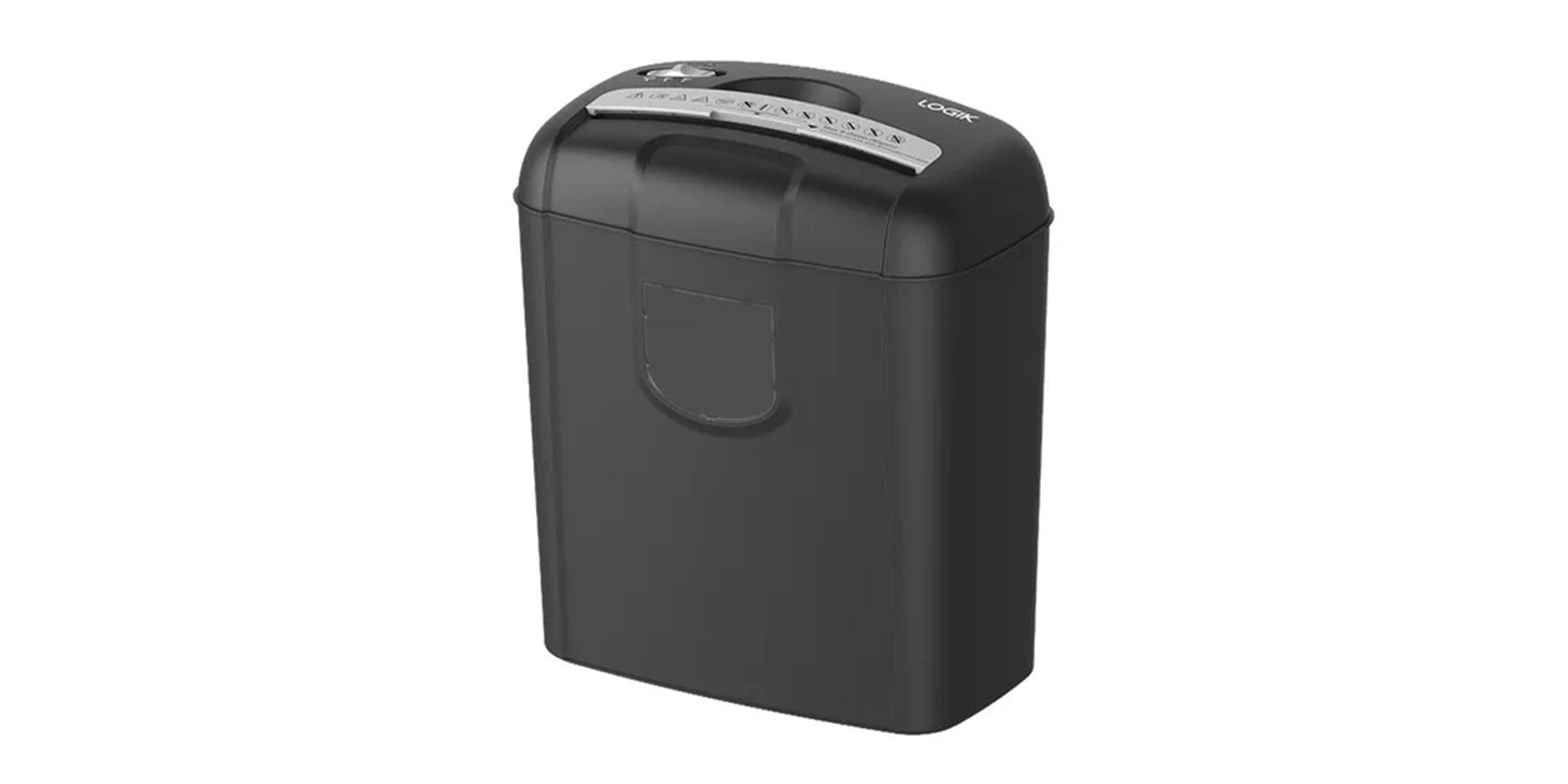
Most recently tested July 2025
Type Cross-cut
Size and weight 37 x 33 x 19.5cm (HxWxD), 3.25kg
Need to know Three minutes claimed runtime/30 minutes cooldown, claimed to shred six sheets at once, P3 security rating, 14-litre bin, accepts credit cards and staples, one-year warranty
ProAction 10 Sheet 21 Litre Cross Cut Shredder
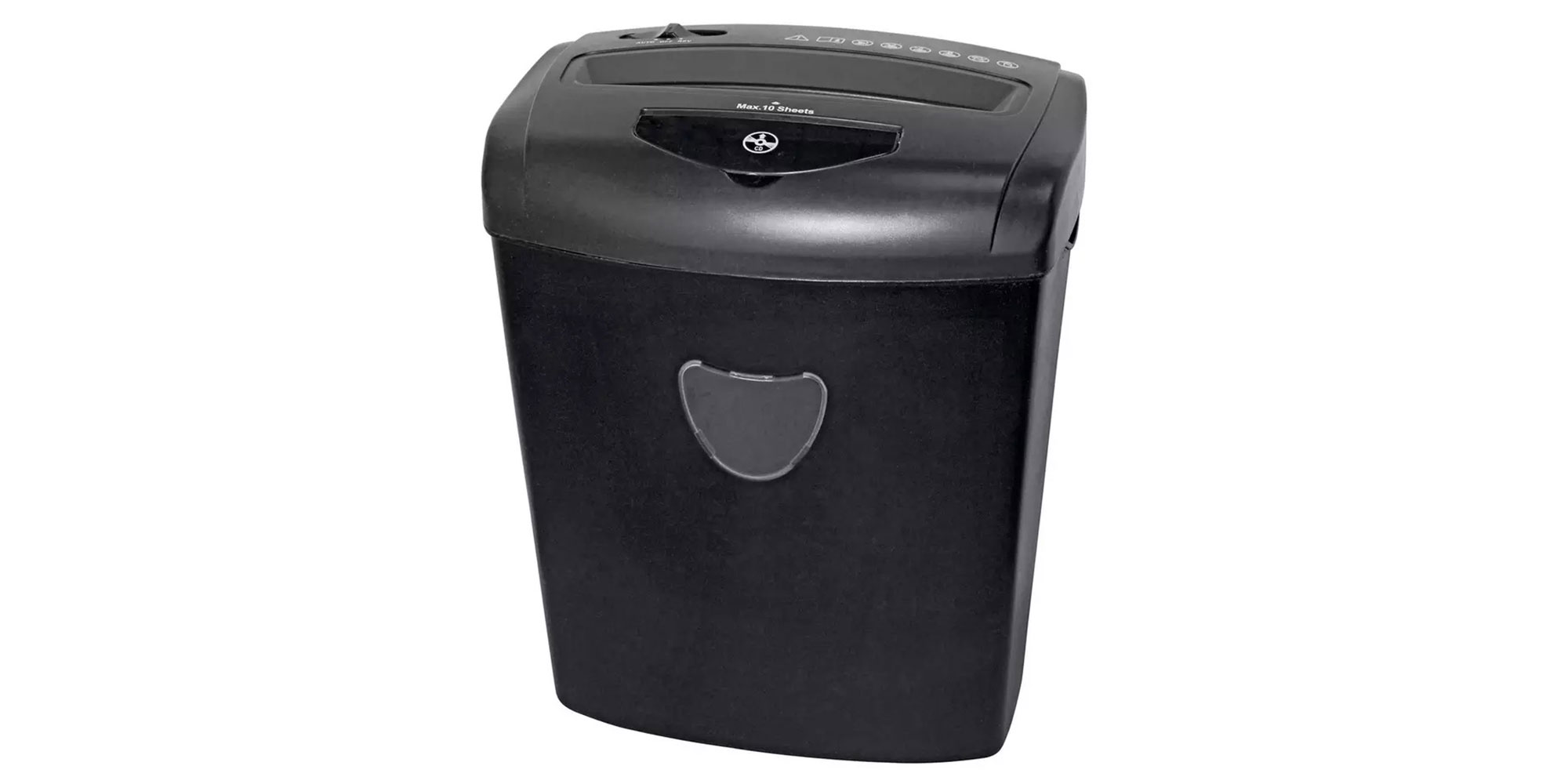
Available from Argos (£45.99) (Only available in store)
Most recently tested July 2025
Type Cross-cut
Size and weight 41.8 x 32.6 x 22.7cm (HxWxD), 5.4kg
Need to know Two minutes claimed runtime/30 minutes cooldown, claimed to shred 10 sheets at once, P3 security rating, 21-litre bin, accepts credit cards and CDs, one-year warranty
Rexel Momentum X410-SL
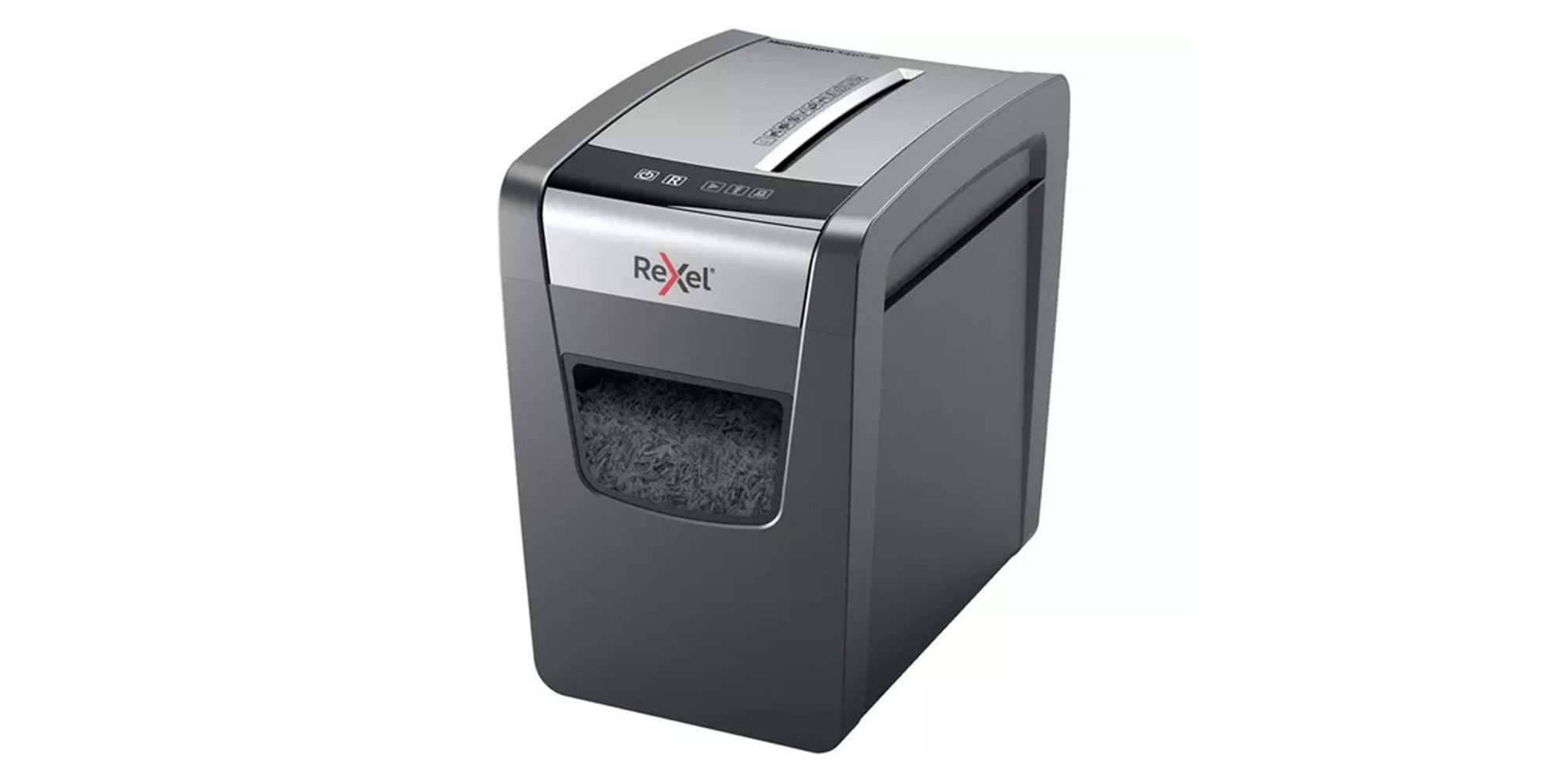
Most recently tested July 2025
Type Cross-cut
Size and weight 37.7 x 37 x 25.5cm (HxWxD), 6.5kg
Need to know Six minutes claimed runtime/60 minutes cooldown, claimed to shred 10 sheets at once, P4 security rating, 23-litre bin, accepts staples and paper clips, two-year warranty
Rexel Secure X8 2020123 Cross Cut Shredder

Most recently tested July 2025
Type Cross-cut
Size and weight 38 x 32 x 17cm (HxWxD), 4.8kg
Need to know Three minutes claimed runtime/cooldown time not stated, claimed to shred eight sheets at once, P4 security rating, 14-litre bin, accepts paper clips and staples, two-year warranty
Be inspired to make home improvements. Sign up for our Home newsletter, it's free monthly
More paper shredders from our tests
Here’s how the rest of the shredders from our tests measured up, listed in alphabetical order.
| Shredder | Price | Score | Security* | Speed | Ease of clearing jams** |
|---|---|---|---|---|---|
| Amazon Basics Strip Cut Shredder AUR161101 | SQUIRREL_TEXT_50011539 | ||||
| Bonsaii 6 Sheet Cross Cut Paper Shredder C237-B | SQUIRREL_TEXT_50021621 | ||||
| Bonsaii 8 Sheet Cross-Cut Paper Shredder C261-C | SQUIRREL_TEXT_50021620 | ||||
| Fellowes AutoMax 90M | SQUIRREL_TEXT_50000128 | ||||
| Fellowes P-30C Shredder | SQUIRREL_TEXT_50011644 | ||||
| Fellowes Powershred 6M | SQUIRREL_TEXT_12880449 | ||||
| ProAction 8 Sheet 15 Litre Micro Cut Shredder | Argos (£43.99) | ||||
| Rexel Momentum X308 | SQUIRREL_TEXT_50011541 |
Date tested: July 2025, December 2023. Page last checked: November 2025. We are not able to show every retailer, and cheaper prices may be available.
*Our simplified rating of how securely the machine shreds documents in a domestic setting. This is separate from the official security 'P rating' of shredders, which ranges from P1-P7 and is often used to determine suitability for use by government, financial institutions and so on. Shredders for home use rarely have P security ratings higher than P4.
**Based on our rating of how effectively the reverse function helps to remove paper jammed in the shredder.
How we test shredders

We independently select and buy the most popular and sought-after shredders sold at UK retailers.
We regularly revisit the shredders on sale to see if there are any more popular models that need testing, and when we find them, we do so.
Shredding security and speed
- We measure a sample of shreds cut by each shredder and rate them based on how easily they could be pieced back together. This is separate from the official security 'P rating' for shredders, which ranges from P1-P7 and is often used to determine suitability for use by government or financial institutions with top-secret documents. Shredders for home use rarely have P security ratings higher than P4.
- We measure how much time it takes for us to shred three sheets of paper consecutively on average. The slowest shredders we've tested take more than twice as long to shred as the quickest.
Simultaneous shredding and clearing blockages
- We've found that shredders can often handle more sheets at once than the manufacturer's stated maximum, but do check the shreds in your bin if you're pushing your shredder to the limit. We do sometimes find that the pieces are larger when lots of sheets are shredded at once.
- Once each shredder jams in our tests, we assess how helpful the reverse function is at dislodging the jam and removing the paper. Some automatically detect jams and push the paper back out easily, while others get stuck.
Ease of use, noise and bin capacity
- We rate how easily paper can be fed into the mouth of the shredder, and how straightforward it is to detach and empty the bin once it's full.
- We use a decibel meter to record how noisy the shredder is when it runs. While no shredder is super quiet, some make much more of a racket than others.
- We count how many sheets you can consecutively shred before either the bin fills to the top, or the shredder overheats and needs to cool down. We've found that a larger bin (measured in litres) doesn't necessarily accept more paper before it needs emptying, as the shape of the bin can cause the shreds to stack to the top more quickly.
Why you can trust us: at Which? we're free from manufacturer and retailer influence. Find out more about our impartiality and how your support helps us to stay editorially independent
Which is better, a micro-cut, strip-cut or cross-cut shredder?

There are three main types of shredder:
- Strip-cut Also known as ribbon-cut, these shred the paper into thin strips. They're less common now, as they're less secure than other types, and it may be possible to reconstruct the strips into a legible document.
- Cross-cut Sometimes known as diamond-cut, these shred the paper into small pieces a bit like wedding confetti, so it would be much harder for someone to reassemble them.
- Micro-cut The most secure type slices paper into such tiny pieces that a criminal would find it extremely difficult, near impossible, to put them back together.
We'd advise you to go for either a cross-cut or micro-cut shredder to maximise your security.
How to unjam a shredder

Many shredders get blocked at some point, especially if you're pushing the upper limits of the number of sheets you can shred at once.
Sometimes, this can be cleared by cycling between the reverse and go functions. Alternatively, it may be that the bin is full and needs emptying.
Clumps of paper sometimes get caught in the blades and will need to be removed carefully when the shredder is unplugged. A tough bit of card can sometimes be effective at dislodging stuck shreds.
Sometimes, the overheat function also kicks in, and you'll need to let the shredder cool down before clearing the jam. This can take from 20 minutes up to an hour, depending on which shredder you have.
News, advice, deals and stuff the manuals don't tell you. Sign up for our Tech newsletter, it's free monthly
Recycling shredded paper
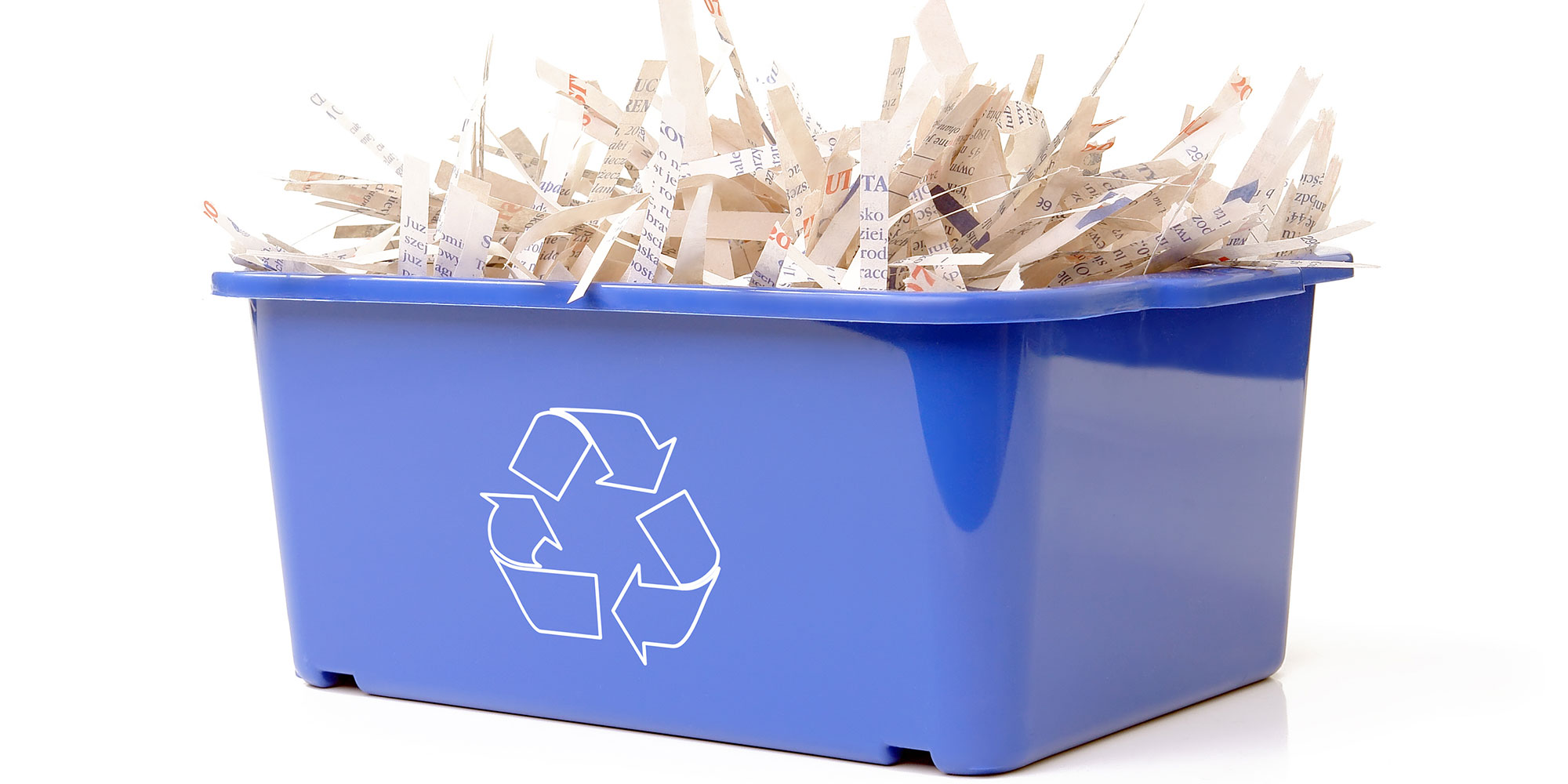
Shredded paper is fine to go through your normal home recycling, but you should keep it separate from the rest of your recycling, as the small shredded pieces can cause trouble for the machines at recycling centres.
The best thing to do is seal up your shredded paper in a bag made of paper or recyclable plastic before adding it to either your main recycling bin or your paper/card recycling bin (depending on how your local recycling system works).
That said, some local recycling centres might not accept recycling in bags, so check on your local council's website first.
If you want to avoid that bother altogether, you can also compost shredded paper. The high carbon content is brilliant for maintaining a healthy compost heap. Make sure to avoid including glossy or coloured paper shreds, though, as they can contain chemicals that aren't suitable for composting.
Got you thinking about composting and waste disposal? Check out our reviews of the best compost and best bin bags
